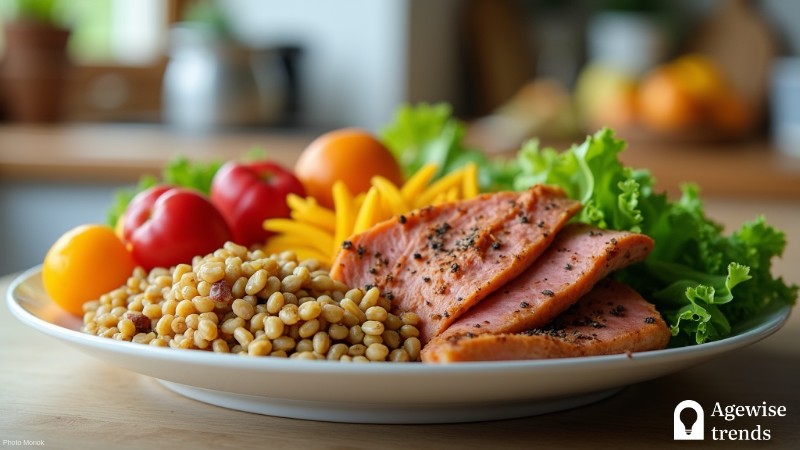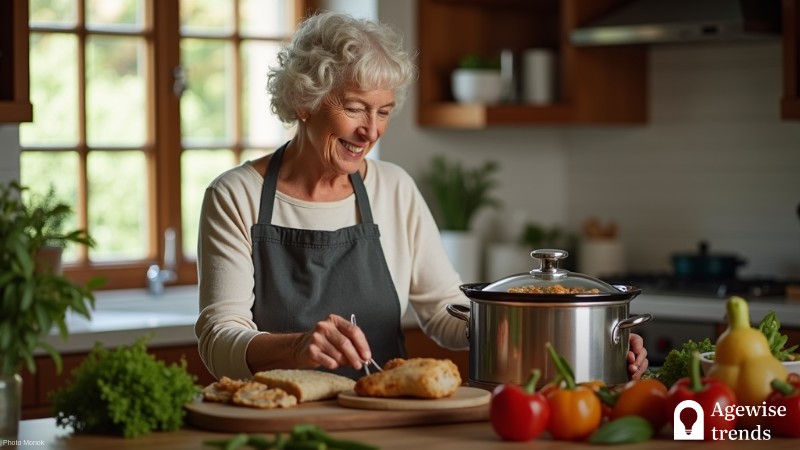Maintaining a well-balanced diet is necessary at any age, but appropriate nutrition is especially important for older persons’ general health and well-being. Meal planning for seniors ensures that they get enough nutrients while also meeting any dietary restrictions or medical issues. Focusing on a senior-friendly diet makes it easier to prepare meals that promote heart health, cognitive function, and overall well-being.
Adopting deliberate meal preparation for seniors enhances independence while reducing reliance on overly processed meals. With the appropriate approach, it is possible to eat meals that are not only nutritious but also tasty and gratifying. A well-planned meal plan can help seniors stay energized, manage chronic diseases, and improve their quality of life.
Key Takeaways
Maintaining a well-balanced diet is crucial for older persons’ general health and well-being, promoting heart health, cognitive function, and overall well-being.
- A senior-friendly diet should include nutrient-dense foods such as vegetables, fruits, whole grains, and lean protein sources to promote heart health and digestion.
- Seniors can reduce sodium intake by choosing fresh, frozen, or no-salt-added canned foods and draining and rinsing canned goods to lower sodium content.
- Effective meal planning for seniors involves balancing needed nutrients while keeping meals pleasurable and simple to prepare, prioritizing convenience and nutritional content.
Creating meals for a senior-friendly diet
To create a senior-friendly diet, it is vital to include nutrient-dense foods that adhere to dietary guidelines. According to the 2020-2025 Dietary Guidelines for Americans, older individuals should consume a wide range of vegetables, fruits, whole grains, and lean protein sources. Prioritizing fiber-rich meals, such as whole grains and legumes, benefits digestion and heart health while lowering the risk of constipation.
Sodium intake is another important issue to consider when planning meals. Seniors should try to minimize meals that have more than 20% of the Daily Value for sodium per serving, as excess sodium can contribute to high blood pressure. Choosing fresh, frozen, or no-salt-added canned foods will help minimize sodium intake while still providing necessary nutrients. When choosing canned goods, such as beans or tomatoes, draining and rinsing them can lower sodium content significantly.
Meal planning for seniors
Effective meal planning for seniors entails balancing needed nutrients while keeping meals pleasurable and simple to prepare. An excellent strategy involves a combination of proteins, healthy fats, and fiber-rich carbohydrates to boost energy and muscle health. Planning ahead of time improves portion control, reduces food waste, and decreases the possibility of unhealthy last-minute meal choices.
Another important part of meal planning is grocery shopping efficiency. While fresh produce is preferred, frozen fruits and vegetables are a practical and healthful option. Shopping outside the store’s perimeter is vital; inner aisles offer valuable basics like whole grains, dried beans, and low-sodium canned items. Choosing these goods guarantees that your kitchen is well-stocked with various ingredients that are appropriate for a senior’s diet.
Meal preparation for seniors
Meal planning for elders should prioritize both convenience and nutritional content. Preparing meals in advance can help to streamline daily routines while ensuring that nutritious options are always available. Cooking at home more frequently helps decrease sodium intake because store-bought marinades, sauces, and processed meats can include a lot of additional salt. Seniors can enjoy a heart-healthy diet that is suited to their unique needs by cooking their own meals.
To make meal preparation easier, simple cooking techniques such as batch cooking and freezing meals for later use might be useful. Using herbs and spices instead of salt improves flavor while maintaining health. Prioritizing nutrient-dense items and limiting processed foods promotes overall health and makes mealtime more enjoyable.
By concentrating on a balanced diet, mindful grocery shopping, and practical meal preparation, seniors can enjoy nutritious meals that support their overall well-being. These strategies help create an accessible and sustainable approach to healthy eating in later years.
Summary
Meal planning for seniors promotes balanced nutrition, cardiovascular and cognitive health, and general well-being. A senior-friendly diet consists of fiber-rich meals, lean meats, and lower sodium intake. Efficient grocery shopping and meal preparation promote independence while providing healthful, home-cooked meals. By focusing on nutrient-dense foods, seniors can enjoy delectable, health-conscious meals that promote life and vigor.














